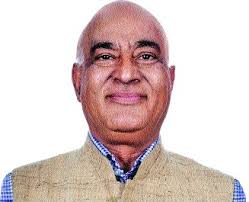Synchronised elections, voter behaviour, and governance outcomes
An active policy proposal of the Government of India is to hold national elections at the same time as the assembly elections of all the states. This article examines whether holding national and stat...
-
 Vimal Balasubramaniam
Vimal Balasubramaniam  Sabyasachi Das
Sabyasachi Das  Apurav Yash Bhatiya
Apurav Yash Bhatiya  28 August, 2020
28 August, 2020
- Articles
Political determinants of newspaper markets in India
Newspapers are an important source of political information for Indian voters. This article looks at how political factors influence the newspaper market. Using the announcement of delimitation in the...
-
 Julia Cagé
Julia Cagé  Guilhem Cassan
Guilhem Cassan  Francesca R. Jensenius
Francesca R. Jensenius  23 November, 2023
23 November, 2023
- Articles
A proposal for public funding of elections and political parties in India
The Finance Minister of India recently introduced measures aimed at cleaning up political party funding in the country. In this article, Gowda and Santhosh highlight the limitations of these measures,...
-
 M.V. Rajeev Gowda
M.V. Rajeev Gowda  Varun Santhosh
Varun Santhosh  21 April, 2017
21 April, 2017
- Perspectives
A conversation on development - II
Parikshit Ghosh (Member of the I4I Editorial Board & Associate Professor of Economics, Delhi School of Economics) speaks with Kaushik Basu (Chief Economist and Senior Vice President, World Bank and fo...
-
 Kaushik Basu
Kaushik Basu  Parikshit Ghosh
Parikshit Ghosh  03 February, 2016
03 February, 2016
- Perspectives
How a corruption scam brought MNREGA to a standstill in Nanded
Nanded district in Maharashtra demonstrated exemplary performance in MNREGA until 2012-13, when the exposure of a corruption scam brought the programme to a virtual standstill. In this note, researche...
-
 Sangita Jadhav
Sangita Jadhav  Ashwini Kulkarni
Ashwini Kulkarni  Aysha Shamsuddin
Aysha Shamsuddin  28 January, 2016
28 January, 2016
- Notes from the Field
Unleashing the full potential of India's 'Open Government Data' initiative
In October 2012, India embarked upon its ‘Open Government Data’ journey, by opening up access to government-owned shareable data in machine-readable formats for the use of general public. In this...
-
 Natasha Agarwal
Natasha Agarwal  26 January, 2016
26 January, 2016
- Perspectives
Access to energy in rural India: A survey of six states
While access to energy is crucial for socioeconomic development, statistically representative surveys on the issue are missing in India. Based on a survey on energy access in six energy-poor states i...
-
 Chao-yo Cheng
Chao-yo Cheng  Abhishek Jain
Abhishek Jain  Johannes Urpelainen
Johannes Urpelainen  18 January, 2016
18 January, 2016
- Articles
Criminally accused politicians and economic outcomes
Despite a history of widely contested and transparent elections, and presence of vibrant and open media, an increasing number of criminally accused politicians are being elected in India. Based on an...
-
 Tasneem Ahmed
Tasneem Ahmed  Nishith Prakash
Nishith Prakash  Marc Rockmore
Marc Rockmore  Yogesh Uppal
Yogesh Uppal  15 January, 2016
15 January, 2016
- Articles
Bihar's alcohol ban: Prudent policy or tail-chasing?
Bihar Chief Minister Nitish Kumar’s decision to implement prohibition in the state from 1 April 2016 is based on the rationale that alcohol consumption is the primary reason for violence against wo...
-
 Sanjeev Kumar
Sanjeev Kumar  Nishith Prakash
Nishith Prakash  21 December, 2015
21 December, 2015
- Perspectives
Intimidation, imitation, economics: Why youth are taking to terror
Men between the ages of 18 and 35 become terrorists, and it is the same demographic that supplies drug dealers, violent criminals, and foot soldiers of political parties. Abhijit Banerjee, Professor ...
-
 Abhijit Banerjee
Abhijit Banerjee  15 December, 2015
15 December, 2015
- Perspectives
Democracy, inclusion, and prosperity
In his speech at the D.D. Kosambi Ideas Festival in February 2015 in Goa, RBI Governor Raghuram Rajan put on his hat as a professor of political economy and spoke about the development of a liberal m...
-
 Raghuram Rajan
Raghuram Rajan  17 November, 2015
17 November, 2015
- Perspectives
Bihar verdict: Development, cow politics, and caste
The Nitish Kumar-led Grand Alliance of JD(U)-RJD-Congress defeated the Modi-led NDA in the recent Bihar assembly elections. In this article, Maitreesh Ghatak, Professor of Economics at the London Sch...
-
 Maitreesh Ghatak
Maitreesh Ghatak  12 November, 2015
12 November, 2015
- Perspectives
Connecting the red corridor: Infrastructure provision in conflict areas
The government’s efforts to develop rural infrastructure have been particularly intense in the 90-odd districts that are affected by Maoism. How successful has the implementation of flagship infras...
-
 Oliver Eynde
Oliver Eynde  Jacob Shapiro
Jacob Shapiro  05 November, 2015
05 November, 2015
- Articles
Breaking the silence on growing intolerance
Recent violent incidents in the country indicate a growing intolerance towards those whom we disagree with, as well as an unwillingness of politicians to defend the rights of people to speak and live...
-
 Abhijit Banerjee
Abhijit Banerjee  26 October, 2015
26 October, 2015
- Perspectives
Economic development and Maoist insurgency
The Indian government’s two-pronged strategy to counter Maoist insurgency involves economic development and military repression. Analysing data for 2006-2011, this column finds that increasing wage...
-
 Anand Shrivastava
Anand Shrivastava  07 October, 2015
07 October, 2015
- Articles
Twitter feed
Tweets by Ideas4IndiaMost Popular Governance Posts
Unique Health Identification and Aadhaar: A case for mandatory linkage
As part of the Digital India initiative, All India Institute of Medical Sciences (AIIMS) issues a Unique Health Identification (UHID) number to each patient, which documents their entire journey in th...
 Mudit Kapoor
Mudit Kapoor  23 December, 2016
23 December, 2016
- Perspectives
Caste dominance in rural India: Cause and effect
Rural India remains a caste-based society. This column explores why caste continues to play such an important role and what the effects are. It argues that trade and agricultural productivity suffer, ...
 Siwan Anderson
Siwan Anderson  16 August, 2012
16 August, 2012
- Articles
Why did the Indian economy stagnate under the colonial rule?
How did the Indian economy fare under the colonial rule? Is the average Indian significantly better off after Independence? This column examines trends in GDP per capita in order to determine the stan...
 Aniruddha Bagchi
Aniruddha Bagchi  16 September, 2013
16 September, 2013
- Articles





 16 November, 2023
16 November, 2023






